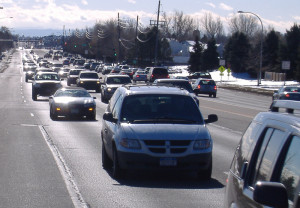When I was a kid in the early 1970’s I remember my family driving up to Fort Collins on I-25, which had two lanes in each direction. The population of the state was 2.2 million then. Today Colorado has swelled to 5.6 million people and the drive up to Fort Collins is on the same meager two lanes. And we wonder why we’re stuck in traffic?

RTD carries about a paltry 2 percent of all the commutes in the Denver-metro area yet spends 50% more than the entire Colorado Department of Transportation spends on roads throughout the whole state. And still we wonder why we’re stuck in traffic.
A decade ago the state legislature spent nearly 10 percent of the state budget on roads. Today that’s closer to 6%. Still asking why we are stuck in traffic?
Instead of funding this core function of government, the social engineers in elective office have been playing bait-and-switch with our roads. As the state embraced Obamacare, via a massive expansion of Medicaid to the point 1 in 4 of us are now on the dole, they funded it by starving our mobility, and forcing us into traffic jams. Their end goal is to get us so road-raged we vote “yes” to raise taxes for roads as a way to actually fund Obamacare.
The crafty folks down at the Denver Chamber of Commerce are doing just that. As reported by ColoradoPolitics.com the Chamber is now playing Star Chamber by holding private, no-press-allowed meetings of elected officials and corporate cronies to put a massive sales tax increase on this fall’s ballot for “transportation.” (The quote marks are because “transportation” used to mean roads and bridges, but under the Chamber’s tax scheme nearly a third of the loot would go to transit and slush funds for cities.)
The legislature did take a step to add a few bucks to roads in the last days of the session that just ended. Senate Bill 1 looks like it could bring billions of dollars to aid our roads. Sadly, looks are deceiving.
In the good part of the bill, SB-1 puts an immediate $495 million towards “transportation” right away. But there are those darn quotation marks again. Again, nearly a third of that gets paid as tribute to transit and slush funds for cities, not roads.
And then u![]() nder SB-1 voters will be asked if it’s okay to bond for $2.3 billion for “transportation,” but not this year. Get this – the vote will be postponed until next year, to give the Denver Star Chamber a chance to raise taxes on this year’s ballot with their tax hike proposal. Cleaver huh?
nder SB-1 voters will be asked if it’s okay to bond for $2.3 billion for “transportation,” but not this year. Get this – the vote will be postponed until next year, to give the Denver Star Chamber a chance to raise taxes on this year’s ballot with their tax hike proposal. Cleaver huh?
Oh, and you caught those quotation marks again. Out of the $2.3 billion that SB-1 could bond, 15% goes to pay ransom to transit. So that leaves around $2 billion left for roads.
But now get ready for this great mathematical slight-of-hand: IF voters okay that bond package (again not this year, but next year) SB-1 then rescinds the $1.8 billion of debt the legislature already passed last year for roads via “certificate of participation,” or “COPS.” In other words, if all this silliness comes to pass next year, roads get around a trifling $200 million over 20 years more than what they are slated to get anyway.
Don’t get me wrong, it is a far more honest way to go into debt by asking voters permission first compared to the COPS scam. But don’t be fooled that roads will be getting billions more, they won’t. Don’t buy the swagger going around the capitol like it’s a major roads victory. But give them points for showmanship.
So, what will bring billions more to needed road funding without it being siphoned off for transit and slush funds, and without raising taxes or fees?
Glad you asked.
The Independence Institute, which I am proud to run, is spearheading an effort to force the state to spend $3.5 billion on CDOT’s most needed road projects, without a tax increase. And with a massive budget surplus and the state raking in some $600 million a year from the new Hospital Provider Tax/Fee, it’s not a heavy lift.
We call it Fix Our Damn Roads, because “Hey Legislature, Do Your Damn Job and Fix Our Damn Roads” seemed a little too long.
We are collecting signatures to get it on this year’s ballot. You will get to decide this fall if roads should again be a priority in Colorado.
Jon Caldara is president of the Independence Institute, a free market think tank in Denver, and a proponent of the Fix Our Damn Roads ballot measure.


